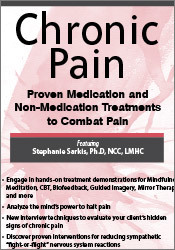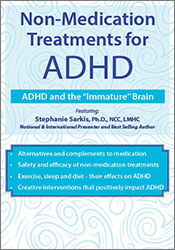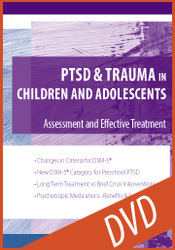Recommended Books for Continuing Education for Clinicians
Are you getting stuck with how to treat clients who have chronic pain? Are your clients experiencing pain but the cause is unknown? It’s frustrating for you as a clinician, and painful and debilitating for your clients.
- Engage in hands-on treatment demonstrations for Mindfulness Meditation, CBT, Biofeedback, Guided Imagery, Mirror Therapy and more
- Analyze the mind’s power to halt pain
- New interview techniques to evaluate your client’s hidden signs of chronic pain
- Discover proven interventions for reducing sympathetic “fight-or-flight” nervous system reactions
Join Dr. Stephanie Sarkis, psychotherapist, author, and international speaker, as she shows you concrete, research-based solutions using real-life examples of chronic pain relief in clients. She will show you how to create effective tailor-made treatments to decrease related stress, anxiety, depression, pain related ailments, and possible suicidal tendencies.
Research-proven treatments include:
- Medication Mirror Therapy
- Biofeedback Mindfulness meditation
- Cognitive-Behavioral Therapy Hypnotherapy
You will also learn acupressure techniques, discover how to create an effective guided imagery script, role play cognitive-behavioral therapy techniques, and see examples of mirror therapy for chronic pain.
In your practice, you will find clients/patients with an ADHD diagnosis who prefer not to take medication. There are various reasons for this – and in this seminar recording you will learn these reasons, and you will learn what other treatment options are available. The more you know the “whys” of your client’s choice of treatment, the better quality of care you can provide them. You will learn about the medications available for treating ADHD, including the benefits and side effects. You will learn the myths surrounding medication, and how to help your client/patient make the most informed choice about their treatment.
Not only will you learn the most common non-medication treatments for ADHD in this seminar recording, you will also learn the safety and efficacy of each treatment. This information is very valuable when considering referring a client/patient for ADHD treatment. You will also learn how much these treatments cost, and if the possible benefits outweigh the financial impact on the client/patient.
The use of nutraceuticals/supplements will be discussed – both how they can impact the central nervous system and why it is important to find a producer with good quality assurance. You will also learn how diet can make a difference in treating ADHD – but not in the way you might think. You will also learn more about the research purporting a link between pesticides and ADHD. Dr. Sarkis, a psychotherapist and published author with more than 15 years of experience in treating ADHD, will show you the path to determining the best ADHD client/patient treatment.
Objectives
- Recognize the benefits and drawbacks of non-medication treatments for ADHD versus medication treatment
- Determine the most common non-medication treatments for ADHD
- Identify the reasons why many patients/clients request non-medication treatments
- Relate the safety and efficacy of non-medication treatments for ADHD
- Determine whether the benefits of alternative treatments outweigh the costs to the patient/client
- Discuss how nutraceuticals/supplements and diet may or may not influence symptoms of ADHD
- Changes in Criteria for DSM-5®
- New DSM-5® Category for Preschool PTSD
- Long Term Treatment vs Brief Crisis Interventions
- Psychotropic Medications -Benefits & Side Effects



